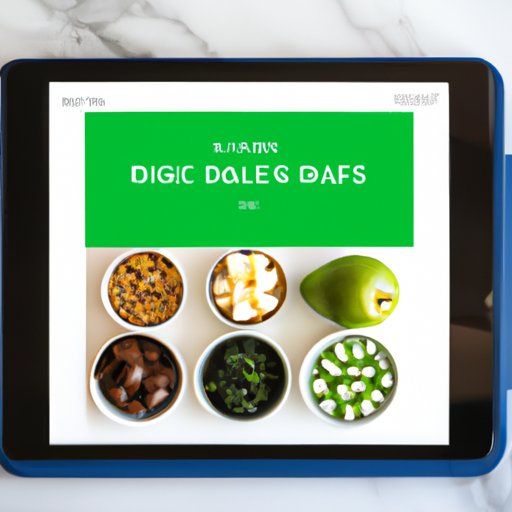I. Introduction
Diabetes is a chronic condition affecting millions of people worldwide. One of the most effective ways to manage it is by following a diabetic diet. In simpler terms, this is a way of eating that focuses on controlling the intake of carbohydrates, saturated and trans fats, and sodium. In this article, we will explore what a diabetic diet is, the types of foods you should include, how to create a meal plan, common myths and facts, plant-based options, low-carb diets, and meal delivery services.
II. 10 Foods You Should Include in Your Diabetic Diet
If you have diabetes, it’s essential to eat foods to help manage your blood sugar levels. Non-starchy vegetables like broccoli, spinach, and carrots have a low glycemic index and high fiber content that can help reduce blood glucose levels. Whole grains like oats, brown rice, and quinoa are also high in fiber and low in sugar. Lean proteins like chicken, fish, and tofu do not cause blood sugar spikes. Other great foods to include are lentils, berries, seeds, and nuts.
III. How to Create a Diabetic Meal Plan
Planning is critical for people with diabetes since blood sugar levels may vary throughout the day. When creating a meal plan, it is essential to focus on portion control, timing, and the right foods. It may help to work with a registered dietitian who can create a customized plan based on your needs. Some tips include eating three meals a day with healthy snacks in between; consuming food at the same time every day, and measuring portions using measuring cups.
IV. The Best Snacks for a Diabetic Diet
Including snacks in your diabetic diet can help keep your blood sugar levels in check. It’s essential to choose low-glycemic index foods with healthy fats and protein. Greek yogurt, hummus, and veggies, nuts, cheese, and apple slices with almond butter, and hard-boiled eggs are great options. It’s essential to make sure your snack portions are pre-portioned and calorie-controlled.
V. Diabetic Diets: Myths and Facts
There are numerous myths related to diabetic diets. One common myth is that people with diabetes can’t consume fruits. However, fruits such as strawberries, blueberries, and raspberries are low in carbohydrates and often do not raise blood sugar levels. Another myth is that sugar-free foods are always healthy, whereas some may contain high levels of fat or carbohydrates. It’s essential to read labels to determine the nutritional value of these foods.
VI. Managing Diabetes with a Plant-Based Diet
Diabetes management can benefit from plant-based diets since it eliminates certain high-fat or high-carb animal products. Legumes like chickpeas, black beans, lentils, and kidney beans are an excellent source of protein and fiber and reduce the risk of heart disease associated with diabetes. Whole grains like brown rice, quinoa, barley, and farro lower cholesterol levels and prevent heart disease. Fruits like blueberries, strawberries, and raspberries are also great options.
VII. Diabetic Meal Delivery Services: Are They Worth It?
Managing a diabetic diet can be challenging, but meal delivery services offer convenience, portion control, and healthy options. However, they can be cost-prohibitive and may not meet everyone’s dietary needs. It’s essential to research the company’s credentials and read reviews before investing in them.
VIII. The Benefits of a Low-Carb Diabetic Diet
A low-carb diabetic diet is an excellent option for people managing their blood sugar levels. It eliminates certain foods that cause spikes in blood sugar levels and focuses on protein and healthy fats. Nuts, seeds, non-starchy vegetables like zucchini, bell peppers, broccoli, and spinach are perfect options. Studies suggest that following this type of diet can help lower blood sugar levels, promote weight loss, and reduce dependence on medication.
IX. Conclusion
Coping with diabetes can be challenging but can be managed through diet modification. Incorporating the foods outlined in this article, creating a meal plan, and knowing the myths and facts surrounding diabetes diets can help reduce the severity of this disease. Diabetic meal delivery services and low-carb diets are viable options that offer convenience and health benefits respectively. With the right tools and mindset, it is possible to take charge of your health and diabetes.
